Vanessa Trevelyan is a Former Chair of the Norwich Society, and presents this video as the Society's first virtual talk.
Bridges of Norwich - self-guided Walk
A riverside trail from Carrow Bridge to New Mills
A riverside trail from Carrow Bridge to New Mills

By Vanessa Trevelyan
A tour of Norwich's bridges, comparing the bridges we see today with historic images.
Vanessa Trevelyan is a Former Chair of the Norwich Society, and presents this video as the Society's first virtual talk.

By John Trevelyan
A look at how to use existing maps in historical research, as well as how to create maps to illustrate research findings.
John Trevelyan is Chair of the Society's Civic Environment Committee, and presents this video as the second in our Historians Virtual Talks Series.
Accompanying notes to this video can be downloaded here.

A look at the history of the River Wensum
This video by Vanessa Trevelyan was originally created for Heritage Open Days 2020.

By Michael Blackwell
An exploration of what sorts of dramatic performances could be seen in Norwich, where these took place and the censorship theatre companies frequently had to deal with.
Michael has led on the coordination of the Society's Historians Group talks for a number of years. He has a particular interest in theatre and in this talk he shares his research on theatre in Norwich during what historians call 'The Long 18th Century', from the Restoration period in the early 17th century through to the Regency period in the early 19th century.

By Jonathan Hooton
Norwich has had the reputation of a pub for every day. This claim is examined and taken as a starting point for finding out where they have all gone.
The Norwich Pub Detective examines the evidence still to be found to identify former pubs in the City of Norwich and its suburbs from the blindingly obvious to the obscure and quirky. It also is an excuse to discuss many of the interesting and intriguing stories from the past that surround our former pubs.
Jonathan Hooton is a City of Norwich Tour Guide, a former Head of Geography at Notre Dame High School and has a fondness for, and plenty of experience of pubs. He has been a regular feature in the Society's event programme, and had been scheduled to deliver both a live talk and a guided tour of Norwich pubs in the 2020 summer events programme.

By Michael Blackwell
A look at the history of pantomimes in Norwich over the past three hundred years. Grab a light-stick and a bucket of pick-and-mix and enjoy the presentation!
On behalf of the Norwich Society Historians Group, Vanessa, Jo and Michael would like to wish our growing band of members a very happy Christmas season…or at least as happy as it can be in the present trying circumstances! We thought we’d give our video release for December a seasonal theme - and what better than a trip to the pantomime!
WATCH THE VIDEO

By Terry George
This talk is a voyage of discovery as Terry introduces viewers to the treasures hidden beneath our feet as we walk through the streets of Norwich.
There are in the region of 80 Undercrofts beneath the city of Norwich, Terry has managed to gain access to around 60 of them. Some are accessible to the public, for example at The Museum of Norwich at the Bridewell and Dragon Hall, but many are located underneath privately owned buildings, haven’t been visited in years and are all but forgotten.
Retirement has provided former teacher Terry George with an opportunity to explore the subjects he is passionate about. Terry’s talk follows on from an article in the Norwich Society’s Member magazine, Aspects of Norwich Autumn 2019, and was received with much enthusiasm and featured in the Eastern Daily Press. This publication can be purchased from The City Bookshop and Jarrold, see publications for details.

By Richard Matthew
A virtual tour of this important, but often overlooked and taken for granted building located in the centre of Norwich.
Richard Matthew is a former Guildhall guide, and this tour focuses on the physical history of the building in the city from the 15th Century through to the present day.
WATCH THE VIDEO

Building Norwich is the first video in our Exploring Norwich Series.
This video by Vanessa Trevelyan looks at the various building phases which have shaped Norwich through the centuries.

Norwich can claim to be one of the most scholarly cities in England, with two universities, one of the earliest public schools, the most popular library in Britain, plus many other places where formal and informal learning can take place from writing to dancing.
Vanessa Trevelyan, a previous Chair of the Norwich Society, takes you on a tour of some of the interesting sites and buildings associated with learning over the centuries - some are well-loved landmarks, others are hidden gems...

By Ian Smith
From the 1780s onwards campaigns against the evils of the trans Atlantic slave trade and the harsh treatment of African slaves in the West Indian colonies grew in importance nationally. Ian will explore the response in Norwich and Norfolk.
How many local people attended meetings? Or signed petitions? And did people actually stop consuming sugar and rum produced by slaves? What roles in the national campaign were played by local figures such as Joseph John Gurney, Amelia Opie and Harriet Martineau?
The anti-slavery movement broke new ground. Never before had petitioning of parliament been deployed so intensively. Never before had weapons like the boycott of goods been used. Never before had public opinion been successfully aroused over the abuse of civil rights in a distant part of the world. Ian evaluates what part Norwich and Norfolk might have played in this success.
Ian Smith is well-known to us as an erudite and fascinating speaker about 18th Century Norwich. After a career in the Diplomatic Service he enrolled at the UEA where he completed a masters degree and began a Ph.D focusing on the history of Norwich during this period. His talk this time will be on Norwich and Norfolk and the Fight against Slavery.
This is a recording of the event, which took place on April 8th, 10:30am as our first live online talk.

By Matthew Williams
The city’s first public sewerage system opened exactly 150 years ago last August, but how were the major geological and topographical challenges overcome in building it? Did it work? Has the system been changed or extended since then?
While preparing on a book about subterranean Norwich, Matt became intrigued by the depth and size of some of Norwich’s sewers, part of a hidden underground system we completely rely on, but hardly ever think about. In this talk, he draws together fragmentary information from a multiplicity of written and visual sources, and has crossed the city looking for manhole covers, to tell the story he calls ‘Norwich’s Netherflow’.
Matt is a chartered geologist and Norwich historian with an interest in tracing continuity from past to present, and in particular in how the city functions as a physical entity – his thesis being that ‘geology drives everything’. He spent 30 years in the construction industry and now enjoys writing local books while working part-time as a professional cycle instructor.
This is a recording of the event, which took place on December 16th, 10:30am.

By Vanessa Trevelyan
1549 was a tumultuous year for Norwich as Robert Kett and 10,000 followers besieged the city and demanded social justice from the king. This is the setting for C.J. Sansom’s best-selling novel featuring Tudor Lawyer, Matthews Shardlake.
This live online talk follows in the footsteps of Shardlake as he visits Norwich and is caught up in the rebellion. This is possibly a first for the Norwich Society, taking a fictional character as the basis for a talk about a key period in Norwich’s past, in an event which will prove just as fascinating whether viewers have read the books or are still yet to! There is still so much of Tudor Norwich to see, and we hope it will encourage people to explore Norwich and read the Shardlake novels.
Our speaker, Vanessa Trevelyan is a past Chair of the Norwich Society but, perhaps more importantly, a founder member of the Friends of Kett’s Heights, which was set up to help maintain the site and raise awareness of its historical significance.
This is a recording of the event, which took place on January 28th 2022, 10:30am

By Phyllida Scrivens
This live online talk will examine the facts behind the tragic events of the night of 10 September 1874, afterwards described by the Board of Trade Inquiry as 'the worst collision on a single track line ever seen in the history of the railways’
This illustrated presentation will also explore the identities of some of the heroes, victims and survivors, as researched in depth by the speaker; names that until now have only appeared in memorial lists of those involved.
Our speaker, Phyllida Scrivens, graduated from the School of Creative Writing at UEA in 2014 with an MA in Biography. Her resulting first book Escaping Hitler, the remarkable life story of the late Joe Stirling, was published by Pen and Sword Books in 2016. Phyllida has since written two further biographical works, The Lady Lord Mayors of Norwich 1923-2017, winner of the Best Biography Prize at the East Anglia Book Awards 2018, and in September last year, The Great Thorpe Railway Disaster 1874, an extensive exploration of a controversial incident which took place only a short distance from her home in Thorpe St Andrew. For over six years Phyllida has been a popular public speaker, sharing stories from her books and research journeys, with audiences in venues all over Norfolk as well as more latterly online.
This is a recording of the event, which took place on February 24th 2022, 10:30am

By Pete Goodrum
A journey through the development of the Jarrold business from its retail beginnings in Woodbridge to its current position - this is the story of a business and the people who built it.
This live online talk explores how and why the business moved locations, expanded into different sectors and withstood commercial and societal changes. Who were the people who built this business? Why is there so much more to this story than is often perceived? Given unfettered access to the Jarrold commercial and personal archives, our speaker – Pete Goodrum – has written the first account of the company’s history in over a century, and the most comprehensive account of the business ever.
Pete Goodrum is a Norwich man. He has held senior positions in advertising agencies, working on national and international campaigns, and now works as a freelance advertising writer and consultant for a wide range of clients in both the public and private sectors. He is also a successful author; his book ‘Norwich in the 1950s’, topped the local best seller charts for almost three months, the sequel, 'Norwich in the 1960s', also reached the number one spot. In 2020 ‘Jarrold 250 Years: A History’, published to celebrate the company’s anniversary, went straight to number one, staying in the charts for the rest of the year. He has also contributed to the Society’s publication, ‘Aspects of Norwich’.
Pete makes frequent appearances on BBC local radio, writes and presents TV documentaries and is a regular reader of his own work at live poetry sessions. Pete has a real passion for the history of Norwich and Norfolk.
This is a recording of the event, which took place on March 31st 2022, 10:30am

By Sophie Cabot
This talk explores the long Jewish heritage of Norwich and the new Norwich Jewish Heritage Group.
A look at Jewish heritage in the city, including the medieval community which flourished from the 11th-13th centuries and the post-readmission community which has been in the city since the 18th century and which is now represented by two active religious congregations as well as many citizens of Jewish heritage. The talk will also introduce the new Jewish Heritage Group for Norwich, which has been developed with the project ‘Community Archives; Skills, Support & Sustainability’ at the Norfolk Record Office, and explain how this group is seeking to expand public knowledge of this aspect of the city’s heritage. Our speaker will ask why Jewish heritage is so underrepresented in people's understanding of Norwich, and offer some ideas for future projects to address this knowledge gap.
Sophie Cabot is a Community Archivist at Norfolk Record Office. An archaeologist by training, she is also Secretary of the Norfolk & Norwich Archaeological Society, and was formerly engagement Manager at Norwich HEART.
Image credit: Picture Norfolk
This is a recording of the event, which took place on April 28th 2022, 10:30am
Join Vanessa Trevelyan as she reflects back on previous centuries and looks at the modern buildings that we hope will be the architectural heritage of the future, many of which have won Norwich Society Design Awards.
This year the Society is collaborating with the Norfolk Association of Architects and Civic Voice in the 2021 Design and Craftsmanship Awards, and this talk includes some of the nominations for these most recent awards.
This is a version of the talk given for Heritage Open Days 2021.
Introducing our 'Exploring Norwich' Series
During COVID we had to suspend our live guided tours programme and instead introduced a series of videos which would take viewers through Norwich landmarks from a particular perspective.
The series also complements the series of self-guided walking tours which can be downloaded from our website.

Norwich was a centre of weaving as early as 1174 and, by the 1670's 50% of freemen were connected with the textile trade. This talk takes you round the sites involved and associated with this historic textile trade.
Our speaker, Vanessa Trevelyan is a past Chair of The Norwich Society but, perhaps more importantly an Honorary Life President of the Costume and Textile Association.
This video was recorded in March 2023.

People's Choice: The Norwich You Love formed part of the Norwich 100 photographic exhibition held at The Forum during Heritage Open Days in September 2023.
The slideshow features places that Norwich people value or hold particularly dear, and can be viewed on the Society's YouTube channel.

This slideshow showcases 77 sites across Norwich where you can see clocks, sundials or weathervanes.
The Norwich Society has produced two reports about clocks, sundials and weathervanes, including directories listing the sites where they can be seen. SEE HERE to read and download Society reports.

John Trevelyan will tell us about The Norwich Society's Civic Environment Committee’s Atlas and Directory of the city’s more than 100 parks and open spaces—many of which have a fascinating and not well-known history. He will identify some of the clues to the past that we can discover for ourselves as we visit the places he will talk about.
John is a member and former chair of the Norwich Society’s Civic Environment Committee and led the project to produce an atlas and directory of parks and open spaces.
This talk was first presented live in January 2023 and recorded in March 2023.

How the Society has supported Norwich for 100 years.
The threat to Bishop Bridge in 1923 prompted the founding of the Norwich Society to help protect Norwich’s historic environment and encourage new development that will be worthy of our fine city. Norwich 100, a photographic exhibition, showcases 100 places in Norwich – one for very year of our existence – that we feel represent our activities and campaigning over the decades.
The exhibition was held at The Forum, Norwich during Heritage Open Days week in September 2023.
This slideshow showcases the photographs displayed during the exhibition and also additional photographs of the 100 places take during the exhibition development process.


This slideshow showcases The Norwich Society's Views Report 2020 which provides an assessment of the views from the River Wensum bridges and strategic views of the Norwich's city centre in summer and winter.
A trail taking in the Norwich buildings with which C.J.Sansom's character Matthew Shardlake would have been familiar.
Three trails to help you explore Norwich’s publicly-viewable clocks and sundials.
This trail looks at some signs of past times: plaques, parish boundary markers, street name signs and a memorial.
5 trails exploring Norwich’s medieval defences.
Three trails around the city centre to encourage you to find out more about Norwich.
This 30 minute walk takes you around the original boundary, or fee, of Norwich Castle
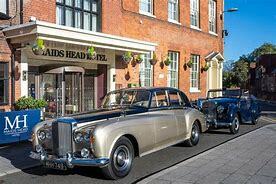
A tour with Paul Dickson of the one of the oldest hotels on the country together with the Maids Head Hotel's fabulous Afternoon Tea.
Norwich tour guide, Paul Dickson will introduce you to the story of the Maids Head Hotel, one of the oldest hotels in the country. To include a tour of the historic public spaces, featuring the late 16th century bar, 17th century Oak Room, former courtyard (now the restaurant) and 18th century assembly room (now the Minstrel's Suite).
The first inn on the site, the Murtel Fish tavern was operating in the middle of the 13th century. A new inn called the Maids Head was constructed in the 15th century and was given it's first name check in a 1472 Paston Letter. The Maids Head went on to become an important coaching inn, with stabling and livery yard for more than 100 horses. It was acquired by Walter Rye in the late 1880s who expanded the hotel on Tombland. The Maids Head has been privately owned by the Chaplin family since 2012. They also own The Ship Hotel, Brancaster and The Gonville, Cambridge.
Please note there are two ticket options for this event. Ticket Option 1: Tour followed by Afternoon Tea starting at 2pm or Ticket Option 2: Afternoon Tea followed by Tour starting at 2.45pm. Tour groups will come together at 2:45pm to enjoy the Maid’s Head Hotel’s fabulous Afternoon Tea in a private dining room.
Please email any dietary requirements.
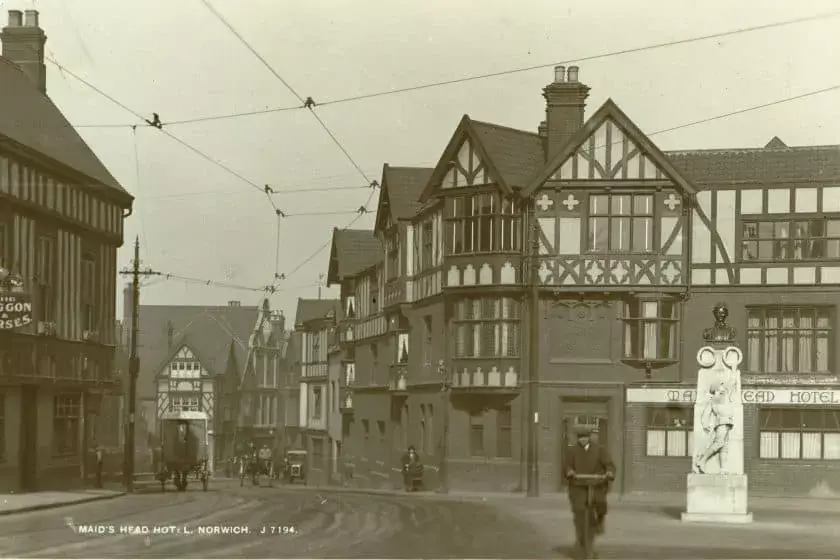
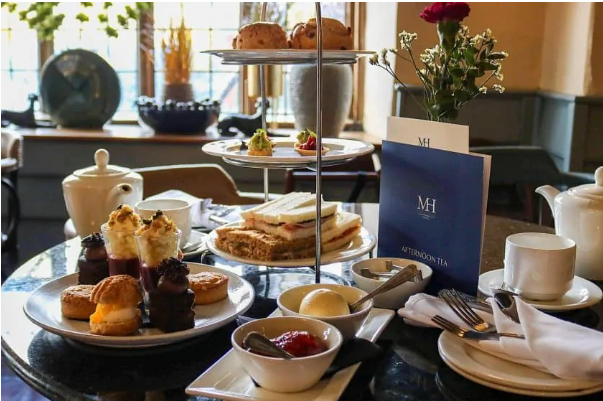

A tour with Paul Dickson of the one of the oldest hotels on the country together with the Maids Head Hotel's fabulous Afternoon Tea.
Norwich tour guide, Paul Dickson will introduce you to the story of the Maids Head Hotel, one of the oldest hotels in the country. To include a tour of the historic public spaces, featuring the late 16th century bar, 17th century Oak Room, former courtyard (now the restaurant) and 18th century assembly room (now the Minstrel's Suite).
The first inn on the site, the Murtel Fish tavern was operating in the middle of the 13th century. A new inn called the Maids Head was constructed in the 15th century and was given it's first name check in a 1472 Paston Letter. The Maids Head went on to become an important coaching inn, with stabling and livery yard for more than 100 horses. It was acquired by Walter Rye in the late 1880s who expanded the hotel on Tombland. The Maids Head has been privately owned by the Chaplin family since 2012. They also own The Ship Hotel, Brancaster and The Gonville, Cambridge.
Please note there are two ticket options, for this event. Tour followed by afternoon tea starting at 2pm or afternoon tea followed by tour starting at 2.45pm. Tour groups will come together at 2:45pm to enjoy the Maid’s Head Hotel’s fabulous Afternoon Tea in a private dining room.
Please email with any dietary requirements.



The appearance in Norwich from 1784 of balloons filled with hot-air, later with hydrogen and much later with coal gas was greeted with growing enthusiasm among the population which quickly developed into ‘balloon mania’. This talk will examine the impact of balloon mania on city life and how these early balloon ascents rarely went smoothly. It will identify some of the worst mishaps and also look at how hoaxers took advantage of the often-credulous population
Since completing a post-retirement BA and MA at the UEA, Ian Smith has pursued his special interest in Georgian Norwich.

Jonathan Hooton's tour of the medieval city of Norwich will take you away from the major road network and off the beaten track.
As an important medieval City, Norwich still has many alleyways away from the major road network. Many of these alleyways have an interesting story to tell. Jonathan will introduce some of these stories in a guided walk from the Market place towards eastern Norwich. It is an almost circular route, returning to the bottom of Westlegate once the tour is over. The secrets of Weaver’s Lane, Boar’s Head Yard, the origin of the name of Winall’s Yard, Chapel Loke, Lady Julian’s cell, Old Barge yard, Stepping Lane and Grouts yard, will all be revealed.
Jonathan Hooton is a City of Norwich Tour Guide, a former Head of Geography at Notre Dame High School and a regular feature in the Society's event programme.
The tour will start by the tower at St Peter Mancroft and take about 1 ½ hours. It is on reasonable footways although there will be several slopes involved in the walk.



SOLD OUT
A tour of waterloo Park followed by a talk centred around the history of Norwich's Waterloo Park, from it's inception in the 1890s to its restoration in the 21st century, using maps, original documents, newspaper articles, and photographs held by the Friends of Waterloo Park, the Norfolk Record office, and other organisations in the county.
Meet outside the café in the park.
Talk and tea and cake in the café.

Another chance to hear Dr Alison Dow bring to life the story of Thomas Buxton and speak to her over refreshments
On the wall in a side-chapel of Norwich Cathedral a modest plaque reads – ‘Remember Thomas Fowell Buxton Bt. Member of Parliament Whose Efforts led to the Emancipation of 700,000 slaves on 1st August 1834.’ These simple words commemorate a towering Norfolk hero whose courage, compassion, bravery and tenacity helped change the lives of hundreds of thousands of people.
This is another chance to hear Dr Alison Dow bring to life the story behind this plaque and to share some new material. Alison will look at the life of Thomas Buxton and the Norfolk and Norwich community that inspired him and supported him though the brutal, decades-long Parliamentary battle that led finally to the end of slavery throughout the British Empire.
Dr Alison Dow was formerly a GP in Mile Cross, Norwich. She was born and brought up in Northern Rhodesia—now Zambia, the country where David Livingstone died and is still revered because of his strong anti-slavery stance. Alison is not the first in her family to undertake research on Africa-related topics—among her relatives she counts some eminent academics specialising in colonial and African history. She is particularly happy to play her part by researching the life of this local historical figure whose role in history has been much overlooked.
Followed by a soft drink and biscuits and an opportunity to speak with Dr Alison Dow.



As an important medieval City, Norwich still has many alleyways away from the major road network. Many of these alleyways have an interesting story to tell. Jonathan will introduce some of these stories in a guided walk from the Market place towards eastern Norwich. It is an almost circular route, returning to the bottom of Westlegate once the tour is over. The secrets of Weaver’s Lane, Boar’s Head Yard, the origin of the name of Winall’s Yard, Chapel Loke, Lady Julian’s cell, Old Barge yard, Stepping Lane and Grouts yard, will all be revealed.
Jonathan Hooton is a City of Norwich Tour Guide, a former Head of Geography at Notre Dame High School and a regular feature in the Society's event programme.
The tour will begin by the tower at St Peter Mancroft and take about 1 ½ hours. It is on reasonable footways although there will be several slopes involved in the walk.



SOLD OUT
A guided walk in the historic market town of Beccles with local historian and town councillor Dr Barry Darch.
Includes tea and cake.
Starting from Blyburgate car park, Beccles, NR34 9TF and finishing at St Michael’s Church for tea and cake
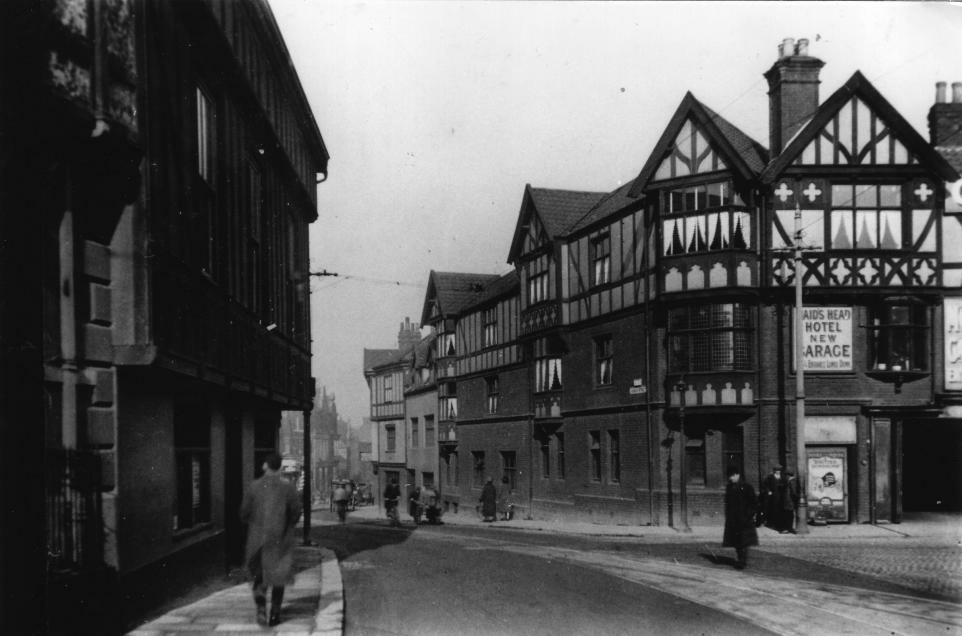
A walking tour of Tombland and the various buildings which make up the Maids Head Hotel.
The tour ends at the Maids Head Hotel for a Charcuterie Board of cured meats, artisan cheeses, pickles, bread, dips, crackers, olives, roasted peppers, dressed leaves and more and a glass of wine or a soft drink.
Please email dietary requirements to admin@thenorwichsociety.org.uk
The tour starts and finishes at the Maids Head Hotel
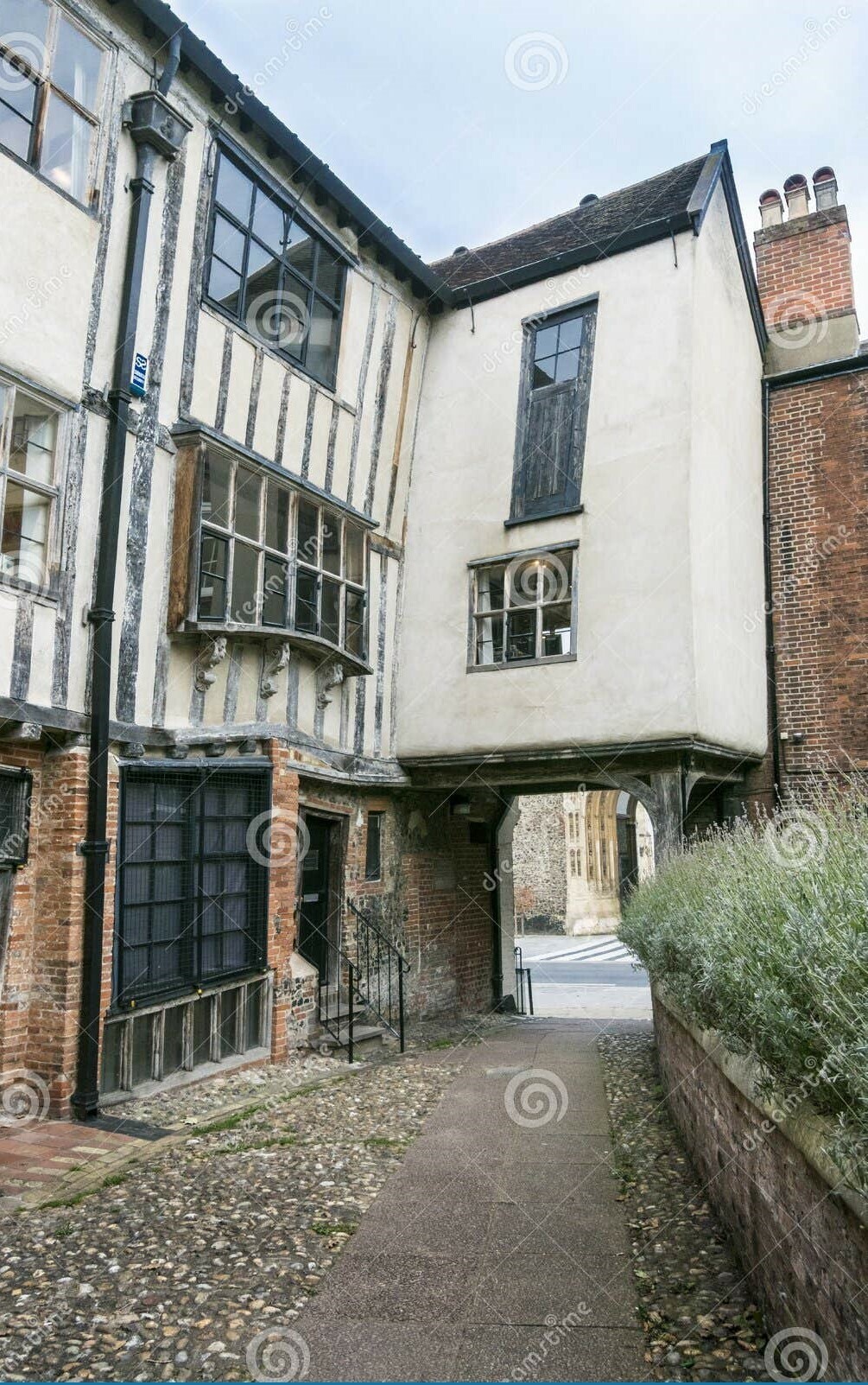

Take a tour of the area with tour guide Roger Smith and find out about the buildings, famous people and events.
Norwich Tour guide Roger Smith will take you on a walking tour along Timberhill, down to Kings Street ending at the Novi Sad bridge, covering notable buildings, famous people and other influential factors of the period.
The tour will begin on Orford Hill and take about 1 1/2 hours. It is on reasonable footways although there will be several slopes involved in the walk.


A walking tour looking at how Norwich developed as a shopping centre with tour guide Annie Ogden
Norwich has always been an important shopping centre, and many of the city centre’s shop buildings can reveal a good deal about the city’s social history and its historic trades and industries. Tour guide Annie Ogden will take you on a wlaking tour which explores, among other things, how the city developed as a shopping centre and how some shop buildings have had significant changes of use over the centuries. Perhaps they offer a glimpse of the future, when some of the stores hit by the pandemic and the rise of online shopping will reinvent themselves.
This 1 1/2 hour tour starts at The Forum and ends on Gentlemans Walk.


Jonathan Hooton will take you on a tour of Norwich celebrating Norwich Castle's Royal Palace Reborn project.
There is much medieval history to unearth in Norwich, apart from it’s wonderful set of churches. Norwich was the second most important City after London for much of the medieval period and has many fascinating stories and buildings to discover on this walk from Tombland to the market place, finishing with a view of the Royal Palace.
Jonathan Hooton is a City of Norwich Tour Guide, a former Head of Geography at Notre Dame High School and a regular feature in the Society's event programme.
The Tour will begin at the Erpingham Gate in Tombland and take about 1 1/2 hours.


Jonathan Hooton will take you on a tour of Norwich celebrating Norwich Castle's Royal Palace Reborn project
There is much medieval history to unearth in Norwich, apart from it’s wonderful set of churches. Norwich was the second most important City after London for much of the medieval period and has many fascinating stories and buildings to discover on this walk from Tombland to the market place, finishing with a view of the Royal Palace.
Jonathan Hooton is an experienced Norwich Tour Guide and former teacher of Geography.
The tour will begin at the Erpingham Gate in Tombland and take about 1 1/2 hours.
